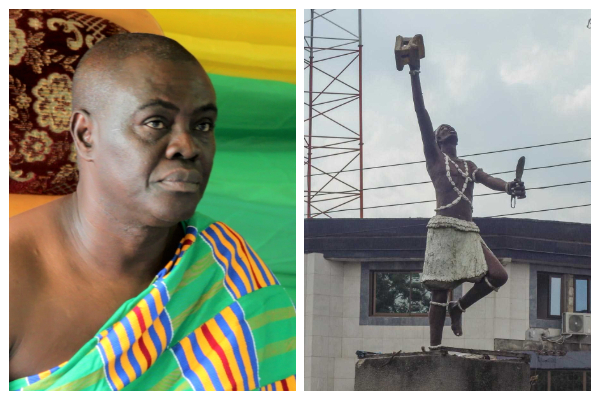Osagyefo Oseadeeyo Agyeman Badu II, Paramount Chief of Dormaa and President of the Bono Regional House of Chiefs, has publicly rejected two widely held Ashanti origin stories — the naming of Kumasi and Kumawu, and the descent of the Golden Stool.
He claims the name “Kumasi” derives from “Akuma Ase Hene,” referencing firewood-cutting tools used under Denkyira rule.
He also dismissed the legend that Okomfo Anokye summoned the Golden Stool from the sky, calling it a fabricated myth.
His remarks have reignited tensions between Dormaa and Ashanti traditionalists.
The Dormaahene, Osagyefo Oseadeeyo Agyeman Badu II, has once again stirred debate over Ghana’s historical narratives, this time challenging the origin stories of Kumasi, Kumawu, and the revered Golden Stool of the Ashanti Kingdom.
In a recent interview shared widely on social media, the Paramount Chief of Dormaa dismissed the popular tale that Okomfo Anokye planted two trees to determine the fate of Kumasi and Kumawu. According to legend, the tree that thrived became Kumasi — “the tree lived” — while the one that died gave rise to Kumawu — “the tree died.” But Agyeman Badu II insists this account is false.
He argued that Kumasi’s name stems from “Akuma Ase Hene,” referencing the axe (“akuma”) used by locals who, under Denkyira rule, fetched firewood for their overlords. He claimed the narrative of tree planting was fabricated and urged chiefs who can read and write to speak boldly against historical inaccuracies.
The Dormaahene also reignited controversy around the Golden Stool (Sika Dwa Kofi), a sacred symbol of Ashanti unity said to have descended from the sky at the command of Okomfo Anokye. Speaking during the launch of the Bonokyempem Council in the Bono Region on August 14, 2025, he questioned the stool’s supernatural origin, pointing to its physical appearance as evidence of human craftsmanship.
“When the Golden Stool was recently displayed, didn’t you see it looked welded?” he asked, suggesting the artifact was manufactured rather than conjured.
His remarks have sparked backlash from Ashanti traditionalists and historians, with some accusing him of undermining sacred symbols and stoking division. Historian Anokye Frimpong responded by asserting that Dormaa’s own ancestors crafted imitation stools that were later seized and melted by Ashanti forces.
As tensions rise, many are calling on the National House of Chiefs and the National Peace Council to intervene and foster dialogue between the two traditional authorities.
Why is the National House of Chiefs and the National Peace Council not bringing this man to order? It’s quite undiplomatic for a chief to constantly attack a group of people. He makes it very easy for people to insult traditional authority. That can’t be healthy for our society. pic.twitter.com/dnDA9406Y2
— DomiNICK (@domynych) September 1, 2025


